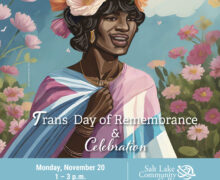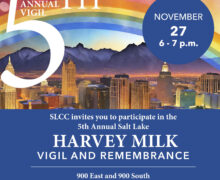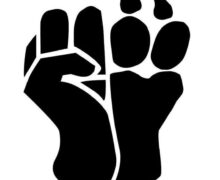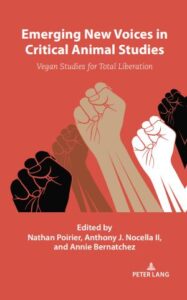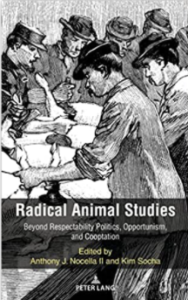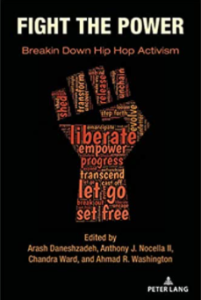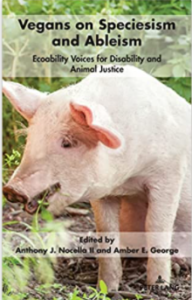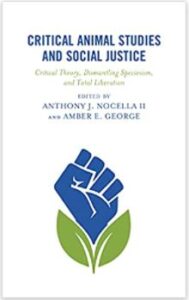November 11th, 2022 – 8th Annual Ecoability Conference
8th Annual Ecoability Conference
November 11th, 2022
Public, Free, Recorded, and via Zoom
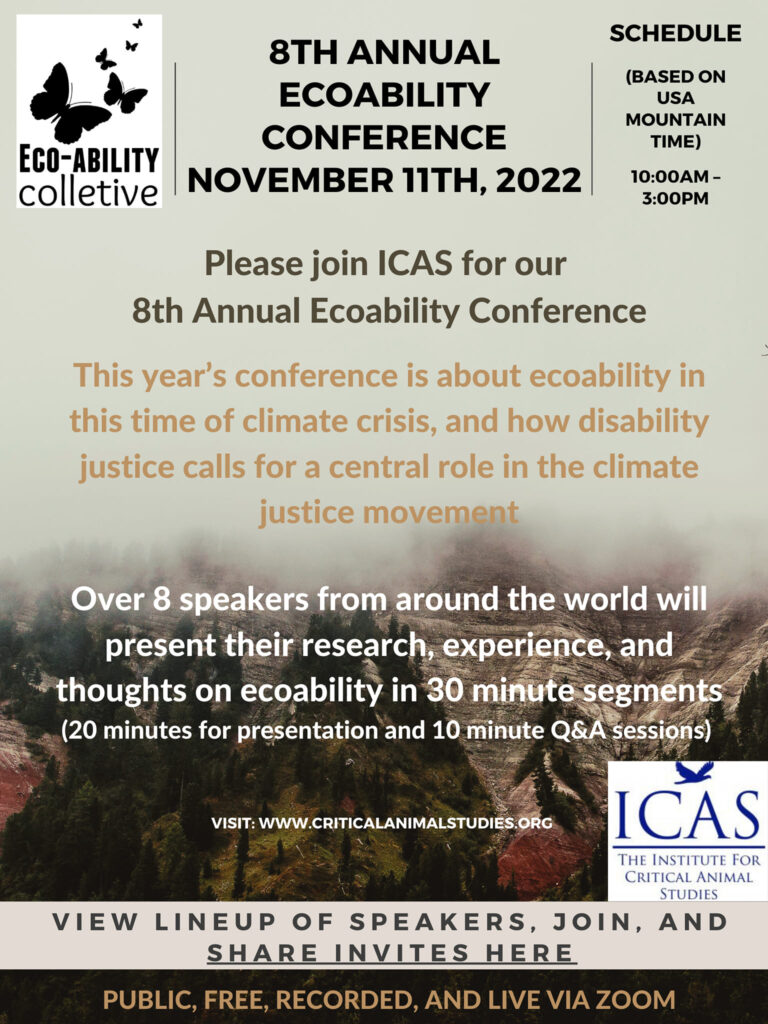
Please click the link here or from the link below to join us for the 8th Annual Ecoability Conference:
https://slcc-edu.zoom.us/j/88507120078?pwd=bS9VN05oVDN2Zm5GcUhjVVhxZmdGUT09
Conferences Chairs: Laura Schleifer
This year’s ecoability conference looks at ecoability issues in this time of climate crisis, and how disability justice needs to take a more central role in the climate justice movement.
INTERESTED THEMES:
Ecoability Movement Voices
Critical disability studies
Disability pedagogy and education
Cultural and Religious intersectionalities
Language Terminology
Policy and/or/versus Culture Social Change
Social and Cultural Construction of Disabilities
Fighting Political and Corporate Repression
Being a Scholar-Activist
Decolonizing Movements and Education
Hip Hop and disability
Rhetoric of Health and Wellness
Social Attitudes of Neuroatypicality
Total Liberation
Anti-Capitalism
Racial Justice
Healing Justice
Social Justice
Youth Justice
Critical Eco-Feminism
LGBT+ Justice
All Speakers have 20 minutes to present with 10 minutes of questions and comments.
SUBMIT
All submissions for the conference need to hold to the mission and principles of CAS and ICAS and to submit in a Word Doc. as an attachment in an E-mail with the following information:
1. Title of Presentation
2. Biography third person 80 to 100 words one paragraph
3. Description/Abstract of the presentation around 200 words third person and one paragraph
SEND SUBMISSION TO:
Laura Schleifer nyartivist@gmail.com
Deadline is: October 10th, 2022
SCHEDULE
(Based on USA Mountain Time)
10:00am – 3:00pm
10:00am-10:10am – Welcoming and Introduction
Biography: Laura Schleifer is the Institute for Critical Animal Studies Director of Regions and Total Liberation, Program Director at Promoting Enduring Peace, Vision Council member of the UK-based Plant-Based Health Justice, and co-founder of Plant the Land, a Gaza-based vegan food justice/community projects team. A lifelong “artivist” and NYU Tisch School of the Arts graduate, she’s performed throughout the Middle East with a circus troupe, taught in China, Nicaragua, and at Wesleyan University’s Green Street Arts Center, performed off-Broadway, and arts-mentored homeless youth. Her screenplay, The Feral Child, was a Sundance Screenwriters’ Lab finalist. Her essays appear in New Politics Magazine , The Leftist Review, Project Intersect, Forca Vegan, The New Engagement, Kropotkin Now! Life, Freedom and Ethics (Black Rose Books, 2021), Neoliberal Schooling of Selfishness and Exploitation: Rubricization and Corporatization of Higher Education, (Peter Lang, 2022) and Fever Spores; William S. Burroughs and Queer Letters, (Rebel Satori Press, 2022). Currently, she’s writing a book, Liberating Veganism, for Vegan Publishers.
10:10-10:30am – Dara Lovitz, “”How the Stigmatization of Mental Health Can Prevent Activists from Achieving Their Goals – One Activist’s Journey to Recovery from Phobias and Anxiety.”
Biography: Dara Lovitz is a passionate activist and working mother of twin daughters who cares deeply about making the world a kinder place. She’s an author, professor, presenter, and co-founding board member of Peace Advocacy Network, a 501(c)(3) nonprofit organization that promotes a peaceful existence through veganism, social justice, and respect for the Earth’s inhabitants and resources. She is the author of Muzzling A Movement: The Effects of Anti-Terrorism Law, Money, and Politics on Animal Activism, Catching Falling Cradles: A Gentle Approach to Classic Rhymes, Twinsight: A Guide to Raising Emotionally Healthy Twins, and Gag Reflections: Conquering a Fear of Vomit Through Exposure Therapy. Lovitz is an adjunct professor of Animal Law and a continuing legal education project coordinator for the American Law Institute. She presents in various forums across the country on animal law, vegan, and parenting topics.
Abstract: Less than half of people suffering from anxiety are seeking treatment for it. A dearth of health care coverage, stigmatization from society, and sufferers’ own embarrassment prevent them from seeking professional help for phobias and anxiety. And these mental health issues can prevent activists from achieving their goals and living their best lives. This session covers one activist’s journey to recovery from emetophobia (fear of vomit – the most common phobia no one talks about) and anxiety through exposure therapy, mindfulness, and acceptance and commitment therapy.
10:30-10:40am Q and A
10:40-11:00am – Nathan Poirier, “Title: Eco-ability, critical animal studies, and my experiences with the medical industrial complex.”
Biography: Nathan Poirier is a doctoral candidate in sociology at Michigan State University with graduate specializations in (critical) animal studies and women’s & gender studies, and previous master’s degrees in Anthrozoology and mathematics. Nathan has held co-leadership roles at the Institute for Critical Animal Studies, is co-director of Students for Critical Animal Studies, and is assistant editor for the Journal for Critical Animal Studies. He co-edited the book Emerging New Voices in Critical Animal Studies: Vegan Studies for Total Liberation (Peter Lang, 2022).
Abstract: This talk presents my experience with the medical industrial complex for my ongoing medical issue which does impede my ability to do certain things. Although I do not personally identify as having a disability, my dermatological condition does make it difficult to perform certain tasks that used to be routine and simple and creates the need to change a number of previous behaviors. This is not to mention doctor visits and the continual inconvenience this causes, as well as the overall negative experiences in seeking medical help. Details of these changes and experiences will be given. Nathan will also present as the assistant editor of the Journal for Critical Animal Studies to encourage those working in eco/ability to submit activist accounts and academic papers there for consideration for publication.
11:00-11:10am – Q and A
11:10-11:30am – Daniel Salomon, “”Getting to Solidarity: Toward An Interest-based Conflict Resolution Approach to Resolving the Conflict between Ecoability and Animal Equity”
Biography: Daniel Salomon is a third-year PhD Student in Urban Studies at Portland State University (PSU). Salomon has a Master of Arts in Theological Research from Andover Newton Theological School (Andover Newton at Yale Divinity School) along with a Graduate Certificate in Science and Religion from the Boston Theological Institute. Salomon holds a BS Cum Laude in Liberal Studies from Salisbury University in Maryland, minoring in Biology, Environmental Studies, and Conflict Analysis/Dispute Resolution, as well as a Naturalist Certificate from the Au Sable Institute of Environmental Studies. Salomon’s research specializations in Urban Studies are Environment and Critical Autism Studies. Salomon is a 42-year old autistic adult.
Abstract: This paper will engage the Autistic Ability movements and Animal liberation movements to rethink the relationship among Autistic Abilities, Animals and the Animal liberation movements from the perspectives of Disability Justice, Intersectionality, the urban context of climate gentrification and win-win interest-based conflict resolution. This paper will explore why making certain individuals into superheroes like Dr. Temple Grandin is harmful to the Autistic and Animal movements alike in a rapidly changing world of isolating like abilities, tokenism, urbanization, social asceticism, globalization of cultural diversity, political polarization, institutional animal cruelty, socio-planetary crisis, post-Covid, post-capitalism and global climate crisis. Getting beyond typical complaining approaches in the Autistic movements and rigid strategies in the Animal liberation movements, this paper will explore the possibility of taking a Disability Justice, Intersectionary, climate resilient, urbanization contextualized, win-win, interest-based conflict resolution approach to Animal liberation. A post-capitalist, animal liberationist versus animal welfare approach based on integrating the Full Range of Autistic Persons and Abilities into the Animal liberation movements and making movements, communities and lifestyles more welcoming, inclusive, accessible, accommodating, individualized, culturally appropriate, mutually respectful and respectful to the dignity of Each Autistic Ability to work towards Animal liberation. As someone who is both an Autistic Person and in solidarity with Animal liberation, radical environmentalism and the socio-planetary struggle, I advocate for the Full Diversity of Autistic Abilities to be included as leaders in the Animal liberation movement and for a Disability Justice lens to be employed for understanding the equity issues of Autistic Peoples, when Animal liberation groups develop their narratives on particular Animal issues.
11:30-11:40 AM- Q & A
11:40 am-12:10 pm- Lunch Break
12:10-12:30pm – Dr. Gregor Wolbring, “Missing the Mark: Youth Environmental Activism, Emergency and Disaster Management, and Disabled People.”
Biography: Dr. Gregor Wolbring is a tenured Full Professor at the University of Calgary’s Cumming School of Medicine, Community Health Science, Program in Community Rehabilitation and Disability Studies. He is presently a member of the Institute for Technology Assessment and Systems Analysis (ITAS), Karlsruhe, Germany and a fellow of the Institute for Science, Policy and Society, University of Ottawa, Canada.
Chiara Salvatore is an undergraduate student at University of Calgary’s Cumming School of Medicine, Department of Community Health Science, Program in Community Rehabilitation and Disability Studies
Brielle Lillywhite is an undergraduate students at University of Calgary’s Schulich School of Engineering, Department of Chemical and Petroleum Engineering
Abstract: We will first present the results of two recent scoping reviews. 1) Lillywhite Brielle and Wolbring Gregor (2022) Emergency and Disaster Management, Preparedness, and Planning (EDMPP) and the ‘Social’: A Scoping Review in Sustainability 14(20), 13519; https://doi.org/10.3390/su142013519. This Project was partially supported by the New Frontiers in Research Fund (NFRF) – 2021 Innovative Approaches to Research in the Pandemic Context competition, Social Sciences and Humanities Research Council of Canada (SSHRC)(NFRFR-2021-00277 Emergency Management Cycle-Centric R&D: From National Prototyping to Global Implementation). 2) Salvatore, Chiara and Wolbring Gregor (2021) Children and Youth Environmental Action: The Case of Children and Youth with Disabilities in Sustainability 13(17), 9950 DOI: 10.3390/su13179950. We will then discuss the findings through the lens of the concepts of eco-ability and eco-ableism and eco-versions of ability security, ability expectation oppression, ability privilege, ability identity security, ability identity abuse, ability inequity and ability expectation and ableism apartheid.
12:30-12:40pm – Q and A
12:40-1:00pm – Ronnie Lee, “THE CLIMATE CRISIS, SPECIESISM AND ANIMAL REBELLION”
Biography: Ronnie is probably best known for being one of the founders of the Animal Liberation Front and for having spent about 9 years in prison for ALF activities.
Abstract: Ronnie Lee will explain how the climate crisis is yet another manifestation of the oppression of other animals by humans and why the root cause of climate breakdown is speciesism.He will talk about the huge contribution that animal agriculture makes to global heating and how the group Animal Rebellion is carrying out direct action in the UK and elsewhere to put pressure on governments to move food production to a totally plant based system.He will also give examples of how vegans can campaign within their local communities to combat the climate crisis from an animal liberationist standpoint.
1:00-1:10pm – Q and A
1:10-1:30pm – Alex Ghenis, “A Conceptual Framework on Disability and Climate Change.”
Biography: Alex Ghenis, MPP, is the Deputy Director at Sustain Our Abilities, the only US-based nonprofit focused on the intersection of climate change, health and disability. He previously managed the New Earth Disability initiative at the World Institute on Disability, where he addressed the connections between climate and disability, including more specific foci such as inclusive transportation and disaster readiness. Mr. Ghenis is currently working to expand SOA’s programming and organizational footprint in ways that support the continued well-being of people with disabilities and the environment.
Abstract: This presentation will introduce a new framework for addressing the complex intersections of climate change and disability. Alex Ghenis, MPP, will present a novel conceptual framework that is designed to guide researchers, advocates and other stakeholders during the struggle for health, well-being, and disability climate justice. This type of guide is critical given climate change is multifaceted and the disability population has diverse qualities and experiences, both medically and socially. The conceptual framework also highlights how many initiatives that are not considered related to climate and disability are actually part of the climate-disability puzzle, whether by feeding our knowledge base or directly contributing to disability climate justice.
1:30-1:40pm – Q and A
1:40-2:00pm – Sarah Conrad, “The Art of Ecological Citizenship: UDL as a Practice of Belonging”
Biography: Sarah Conrad is an Assistant Professor of Philosophy at Prairie View A&M University. She is a field philosopher who seeks to address wicked problems in a multi-and inter-disciplinary manner creatively. Her research highlights the value of just environmental sustainability initiatives; examines the complex ethical dimensions of intersectional embodied experiences, emphasizes understudied aspects of how criminal justice intersects with environmental justice; embraces critical theories of pedagogy, and seeks to connect daily practices with global thinking.
Abstract: Implementing Universal Design for Learning (UDL) in the college classroom is both a strategy and an expression of Ecological Citizenship. To support this assertion, I first describe and distinguish between ecological citizenship and UDL, contextualizing their histories and emphasizing their common goals of equity and inclusion. I then propose a framework for designing learning experiences aimed at cultivating ecological citizenship that integrate UDL mitigations. To demonstrate the framework’s application, I share an example of a project designed for an Environmental Ethics course taught at an HBCU built on the site of a former plantation that enslaved African Americans. The project encourages learners to 1) reflect on the site’s history of the intertwined exploitation of humans and earth others, 2) explore plant communities on campus, and 3) critically interrogate the problematically named concept of “plant blindness” using the values and goals of UDL and ecological citizenship to cultivate a sense of belonging in the classroom and within the local ecosystem.
2:00-2:10pm – Q and A
2:10-2:30pm – Alaina Sigler, ” “For More Freedom: A Personal Vision of Therapeutic Interspecies Community”
Biography: Alaina Sigler is studying the effects of transspecies communities and relational agency at formally farmed animal sanctuaries with an emphasis on animal chaplaincy to provide mutual aid for animal, human, and earth liberation activists experiencing burnout and/or compassion fatigue. She has been supporting efforts for Total Liberation through grassroots organizing, resident care at farmed animal sanctuaries, anti-speciesist permaculture project implementation, vegan food justice efforts, and more for close to a decade. Alaina joyfully participates in gardening, hiking, practicing nonviolent communication, and experiencing moments of peace while outdoors with her partner Dylan in the Denver, Colorado area.
Abstract: Drawing on lived experiences of burnout as an activist for the animal freedom movement, Alaina will share a personal vision of a transspecies community at a formally farmed animal sanctuary that centers on animal chaplain support. In addition to personal experiences, Alaina will explore studies that highlight symptoms of burnout and methods that have enabled some activists to persevere with earth liberation advocacy for 10+ years. Rooted in mutual aid for other-than-human individuals, plant life, and humans, Alaina will discuss how using ritual and tools of spiritual companionship can ease as well as eliminate burnout and compassion fatigue. Animal Related Engagement paired with Critical Animal Studies enables animal, human, and/or earth liberation driven activists to access online and in-person chaplain support for those who have experienced secondary-traumatic stress disorder, compassion fatigue, and/or burnout to cultivate new awareness of their inner selves evoking self-empathy and connection to others. Drawn from an ethnographic study that took place at VINE Sanctuary, she will discuss some freedoms of residents to act on their interests in accordance with relational agency. Ideas that stir in her mind include ways to enable accessible spaces of healing and connection for all (with recognition that residents have lived experiences of exploitation and trauma). An area that will continue to be pursued by Alaina is how will anti-speciest permaculture projects influence our connection to all life that surrounds our space of healing?
2:30-2:40am – Q and A


